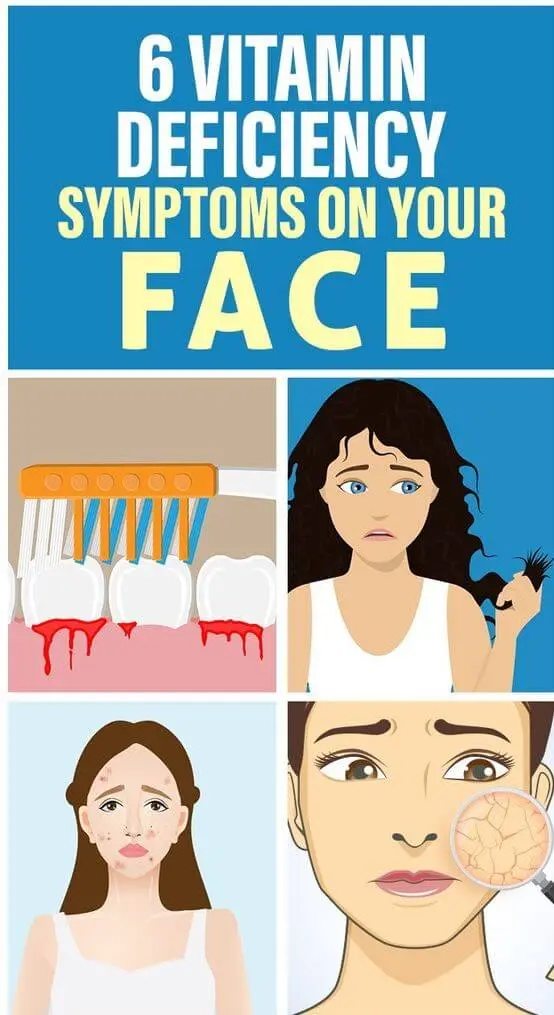


A balanced, nutritious diet has many benefits. On the other hand, an unhealthy diet may cause a variety of unpleasant vitamin deficiency symptoms. These symptoms are your body’s way of dealing with possible vitamin and mineral deficiencies. Being aware of them can help you prepare your diet properly.

A variety of factors can cause hair loss and nails. One of them is the lack of biotin. Biotin, also known as vitamin B7, helps the body convert food into energy. Biotin deficiency is very rare, but when it does occur, hair and nails breaking, thinning, or cracking are some of the most notable symptoms. Other symptoms of biotin deficiency include chronic fatigue syndrome, muscle aches, cramps, and itching of the hands and feet. Biotin-rich foods include egg yolks, organic meat, fish, meat, milk, nuts, seeds, spinach, broccoli, cauliflower, sweet potatoes, yeast, cereals, and bananas.
It is common to see a small amount of blood after cleansing, but if you notice that your gums are sensitive, and bleeding frequently, this may be a vitamin deficiency symptoms. Symptoms of scurvy include easy scratches, easy bleeding, and joint and muscle pain. Vitamin C plays an important role in wound healing and the immune system, and it acts as an antioxidant, helping to prevent cell damage. Your body does not produce enough vitamin C, so the only way to maintain a good diet is to eat it.
Healing food includes oranges, grapefruit, strawberries, broccoli, etc.
If your lips are pale, this could mean that you have anemia, and you need a lot of iron in your diet. Catching extra flu can be suspected of low iron levels, and a lack of iron can weaken your immune system. In addition, the combination of pale skin and pale lips is a symptom of anemia.
Healing food includes Red meat, seafood, beans, leafy greens, fortified grains, and peas.
Seborrheic dermatitis (SB) and dandruff are part of the same group of skin disorders that affect your body’s oil-producing areas. Both include itchy skin. Dandruff is found only on the scalp, and seborrheic dermatitis may appear on the face, chest, and buttocks. Dandruff and seborrheic dermatitis can be caused by several factors, including poor nutrition. For example, low blood levels of zinc, niacin (vitamin B3), riboflavin (vitamin B2), and pyridoxine (vitamin B6) may play a role. Foods rich in niacin, riboflavin, and pyridoxine include whole grains, poultry, meat, fish, eggs, milk, organ meat, legumes, raw vegetables, starchy vegetables, nuts, and seeds.
Seafood, meat, whole grains, milk, nuts, and whole grains are good sources of zinc.
Vitamin K or B12 deficiency is known to be a major cause of puffy eyes. Add plenty of fruit and vegetables to your diet and plenty of water to get all the vitamins and minerals. Reduce your salt intake. Smoking is dangerous to your health and can cause circles under the eyes and swelling. Vitamin E and almond oil together in the under-eye area can help to lighten dark circles and reduce under-eye puffiness, due to the combination of anti-inflammatory and antioxidant properties that these two oils contain.
Healing food includes yogurt, strawberries, potatoes.
Keratosis pilaris is a condition that causes bumps on the cheeks, arms, and thighs. This condition usually occurs in childhood and naturally disappears into adulthood. Keratosis pilaris may be genetic, which means that a person is more likely to have it if a family member has it. That being said, it has also been observed in people who eat foods rich in vitamins A and C.
Thus, in addition to traditional herbal remedies, people with this condition may consider adding vitamins A and C to their diet. These include eggs, milk, dark leafy vegetables, orange, and fruits.